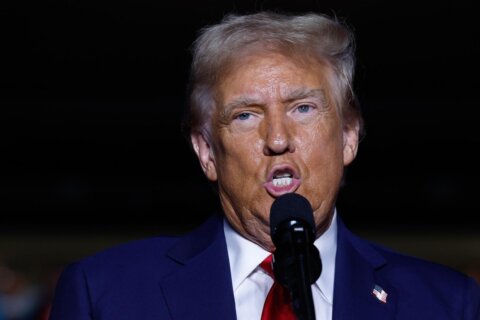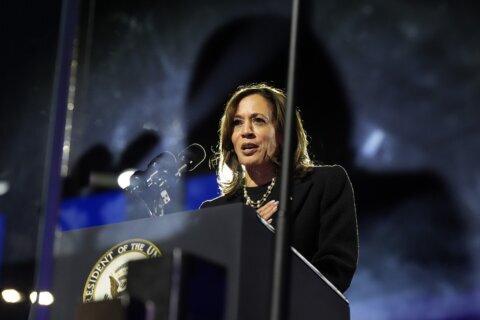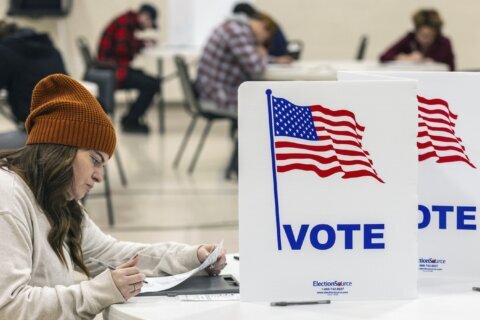The race between President Joe Biden and former President Donald Trump is the first presidential election in nearly 70 years in which the same nominees will face off against each other in a rematch.
With Biden and Trump clinching their respective parties’ prospective presidential nominations this week, the pair is poised for the seventh rematch in U.S. history this November (out of 60 total presidential elections).
Most of those elections happened before the 20th century, according to Matt Dallek, a political historian and professor at George Washington University in D.C.
In every instance throughout U.S. history — going back to the first rematch in 1800 between John Adams and Thomas Jefferson — the repeat nominees have faced off against each other in back-to-back presidential election cycles, squaring off again just four years after the initial matchup.
Here’s a look back at those elections and what helped set the stage for repeat nominees.
Most recent rematch — nearly 70 years ago
Dwight D. Eisenhower vs. Adlai Stevenson, 1952 and 1956
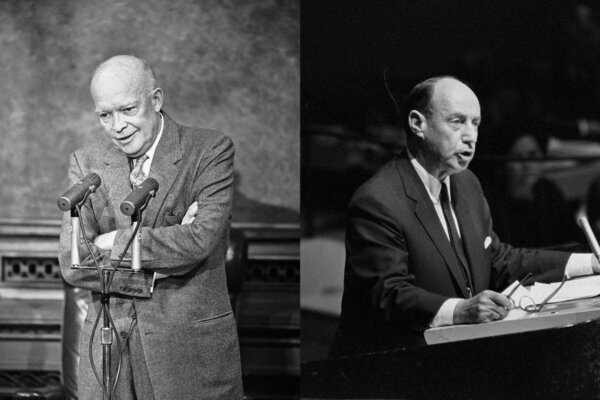
The 2024 rematch is the first since Republican President Dwight D. Eisenhower ran as an incumbent against Democrat Adlai Stevenson in 1956, following an initial battle for the presidency four years prior.
“Stevenson was a liberal darling and was beloved by many liberal Democrats,” Dallek said.
Still, he was defeated both times. Eisenhower ran away with the 1956 election — Stevenson won just seven states.
First rematch in history — more than 200 years ago
John Adams vs. Thomas Jefferson, 1796 and 1800
The matchup between John Adams and Thomas Jefferson was the first competitive presidential election following George Washington’s presidency. It was also the first instance in U.S. history where the same nominees battled for the presidency in twice in a row.
When it came time for the men to face off for a second time, Dallek said, “it revealed a constitutional flaw, and was ultimately just a chaotic mess.”
As it turned out, there was nothing stopping electors from using their two allotted votes to vote twice for a presidential nominee and not cast any vote for a vice president.
The House deadlocked for a week.
“It took them 36 ballots to select Jefferson,” Dallek said.
That election prompted the ratification of the 12th Amendment to the U.S. Constitution, which created separate balloting for president and vice president.
Jackson supporters’ “vengeance” bears resemblance to Trump’s 2024, historian says
John Quincy Adams vs. Andrew Jackson, 1824 and 1828
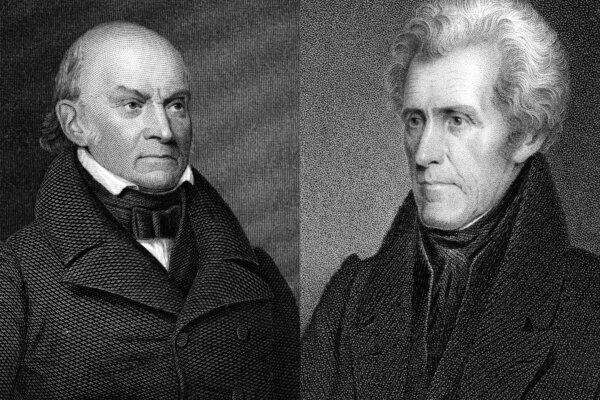
There were four major candidates running in the 1824 election when John Quincy Adams beat out Andrew Jackson.
Jackson won the most popular and electoral votes, but he fell short of the majority needed to be elected. Instead, a congressional representative from every state got to vote for their pick and Adams was elected as president.
That loss fueled anger among Jackson and his supporters.
“The sense was that basically, Adams had been manipulative and really, they vowed revenge,” Dallek said. “Adams had prevailed as part of a ‘corrupt bargain,’ as they called it.”
Jackson was redeemed in 1828, setting a precedent that remains in modern-day elections with the defeated party vowing to be reelected in four years.
Dallek compared the upcoming election to 1828 with both Jackson and Trump, as well as their supporters, feeling wronged by the prior election’s results and carrying a desire for “revenge” through reelection.
“This idea that the other side, if not literally … there’s a sense that they figuratively stole power or that, somehow, power was seized from them,” Dallek said.
Martin Van Buren vs. William Henry Harrison, 1836 and 1840
The remaining presidential races, including the election when Martin Van Buren faced William Henry Harrison, predated the founding of the Republican Party.
“It gives you a sense of just how really antiquated and unusual it is, at least in modern times, to see a rematch,” Dallek said.”
Buren was a Democrat and Harrison a member of the Whig party.
After making his comeback and being elected in 1840, Harrison died 31 days after his inauguration — making his time in the Oval Office the shortest in U.S. history.
“We’ll be back”: Sentiments from an outgoing first lady in the 19th century hold true today
Grover Cleveland vs. Benjamin Harrison, 1888 and 1892
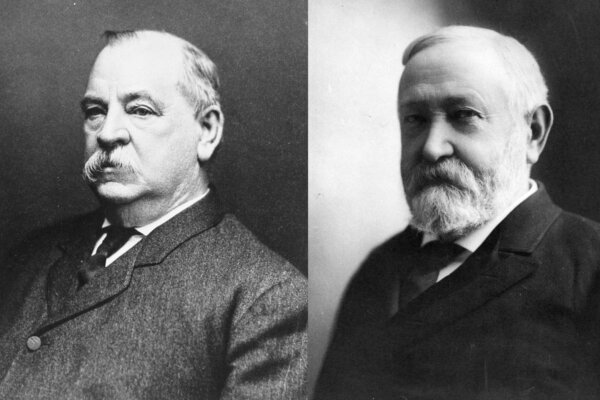
Democratic President Grover Cleveland was defeated by his Republican challenger Benjamin Harrison in 1888.
After Cleveland was unseated from the Oval Office, his wife Frances seemed to believe the couple would be back in the White House.
“His wife apparently told the White House staff to ‘take good care of all the furniture and ornaments in the house,’” Dallek said. “She ‘wanted to find everything exactly the same’ when they returned four years later.”
Frances’ forecast was correct — Cleveland made a comeback in 1892, this time beating President Harrison.
Dallek compared Frances’ vengeful sentiment of “we’ll be back,” to that of Trump and his campaign.
“The desire for revenge is a very human emotion,” Dallek said.
William McKinley vs. William Jennings Bryan, 1896 and 1900
Democrat Willian Jennings Bryan lost to Republican President William McKinley both times he ran against him, repeating a pattern of the races between Eisenhower and Stevenson in 1952 and 1956.
“In the two most recent rematches, the defeated party candidate, who made a comeback and won the nomination a second time, lost again, and actually lost more badly the second-go-round than they had the first,” Dallek said.
Bryan lost despite being an “incredibly fiery speaker” who was considered one of the first major populous party candidates, Dallek said.
How did we get here? History repeats itself with first presidential rematch in 70 years
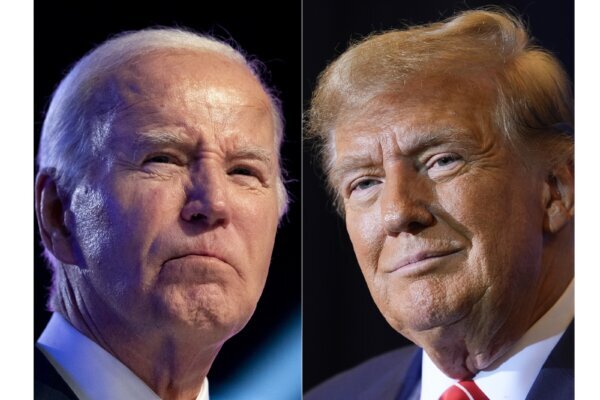
With most of the prior rematches being in the 19th century, Dallek said it’s hard to determine how relevant they are in 2024 because campaigns and elections have transformed over time.
“You can find different kinds of precedents and historical analogies, but I don’t think there’s any one pattern or singular insight into what’s happening today,” Dallek said.
But there are a couple of factors that Dallek said may have contributed to the 2024 election being the first rematch in nearly 70 years.
For one, Dallek said the deepening polarization over the past five decades has contributed. With some Republicans falsely believing Trump won the 2020 election, Dallek said the party’s “radicalization” is a factor, too.
“It makes it harder … for Republican voters to pick someone who they think might have a better shot at winning the general election, like ‘a Nikki Haley,’ who does better in almost all the polls against Biden,” the political historian said.
Some Republicans voters, Dallek said, revert to a “more hard-core MAGA position where they want vengeance for what they wrongly believe was a stolen election.”
Both the country and the Electoral College are narrowly split, he said.
“It raises the stakes of each election,” he said. “It makes the language more apocalyptic.”
Given the polarization and the political climate overall, both parties likely know that regardless of who they pick, the candidate will mobilize enough party members to get at least 47% of the vote. Dallek said that means parties can be less calculating about their nominee.
The narrow margins in the Electoral College have made it easier for Trump to falsely claim the election was fraudulent, Dallek said, thereby mobilizing voters on the claim four years later.
“Because it was relatively close in the Electoral College, and in those key swing states that Biden won, I think it gave Trump a real opening to make another run at the nomination,” Dallek said.
How does 2024’s election compare to the American Civil War?
Outside the lens of rematches, some historians have compared the 2024 race to elections around the time of the Civil War when candidates pitted Americans against each other.
With heightened tensions over the issue of slavery, Dallek said, at the time, the country was similarly divided and held “the potential for political violence.”
That was in part contributed to by “the sense that there are two sides, even though of course, there are multiple sides,” Dallek said.
Both candidates have made the argument that the “greatest threat to the country” is within, he said.
“I think part of the reason that certainly some of voters say that they’re dreading this rematch, is because they’re very wary of this idea,” Dallek said.
Get breaking news and daily headlines delivered to your email inbox by signing up here.
© 2024 WTOP. All Rights Reserved. This website is not intended for users located within the European Economic Area.


